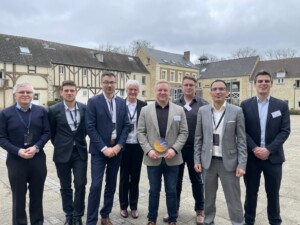Raw materials industry needs fuel modernisation of university education programmes
In the context of engineering education sometimes seen as traditional, meeting the challenge of modernising and developing university education programmes in accordance with today’s raw materials industry’s needs has been the objective of the CDIO-2 project, headed by EIT RawMaterials partner Chalmers University of Technology.
We want to transform engineering education in the raw materials sector to be more attractive for students and secure the quality of the education to meet the societal and industrial challenges. Additionally, we want to get even better at providing graduates with the skills needed for transformation to the raw materials industry.
Erik Hulthén, Associate Professor and Head of Programme at Chalmers University of Technology
Graduates need a range of skills
For graduates to flourish in the raw materials industry, purely technical skills are insufficient, concludes Catrin Edelbro, Geomechanical Engineer at Itasca and the initiator of the project. Edelbro is one of the driving forces behind the implementation of the Conceive Design Implement Operate (CDIO) concept in technical MSc programs related to raw materials in Sweden. “For example, students in engineering education programmes seldom, or never, practice entrepreneurial, communication and innovation skills. These skills are needed, especially in small and medium sized companies.”
The Concept-Design-Implement-Operate (CDIO) approach applied to raw materials education at leading European Higher Education Institutes gives the next generation of engineers the skills needed to solve the challenges facing the raw materials industry.
Within our framework, entrepreneurship education presents a valuable pedagogical approach to foster the necessary skills of the students through integrated, hands-on, active learning experiences.
Erik Hulthén, Associate Professor and Head of Programme at Chalmers University of Technology
Implementing the CDIO framework in existing MSc programmes, as well as a ‘technical faculty’ with increased pedagogic, entrepreneurial, and engineering teaching skills, will enable the creation of sustainable and innovative methods for solving raw materials industrial challenges. Students in their higher education, typically at MSc level, will develop the necessary skills in communication, business, entrepreneurship, and design thinking in addition to the technical skills required for raw materials related projects.
300 professionals trained
To date, the CDIO-2 project has successfully trained 300 academic teachers and industry representatives in Faculty courses. Furthermore, core partners Luleå Technical University, Chalmers University of Technology and the Technical University of Madrid, as well as representatives from the raw materials industry have jointly developed courses, programmes and innovative labs for courses in mining engineering.
CDIO-2 is a well-run and successful project that has applied and implemented modern teaching methodology in traditional education programmes. It is the first time this kind of methodology has been applied to education programmes in the metal and mining industry. This project has been important and successful, and we would like to apply and develop the methodology further within the industry.
Per Storm, Director at EIT RawMaterials Innovation Hub North
The EIT RawMaterials network has been of great benefit to successfully reaching the project’s objectives, says Erik Hulthén. For example, industry and academic staff have worked together in developing and implementing industry challenge-based programmes and courses.
The EIT RawMaterials network in Spain, Sweden and Germany has been vital for us to successfully complete the integration of the method in regional innovation ecosystems. Our success demonstrates the strengths of the EIT RawMaterials network.
Erik Hulthén




